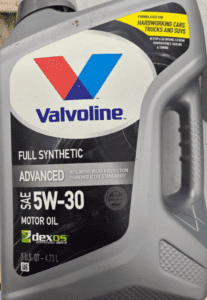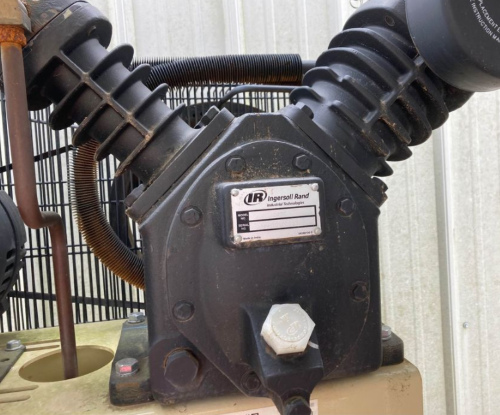Can you put 5w30 oil in your air compressor? No. You shouldn’t.
If you ask the owner’s guide, it is going to recommend using a non-detergent type of oil.
HOWEVER, if you ask any construction foreman, he probably runs Mobil 1 5w30 or 10w30 in his single-stage compressor.
As a rule of thumb, any 20-weight or 30-weight non-detergent oil should work.
We have a list of high-quality compressor oils that you should consider.
See Also: 10w-30 oil in air compressor?
Can You Use Motor Oil In Your Compressor?
Most manufacturers include a clause like this one in their compressor manual “This warranty excludes these items (specific to lubricated compressors) as follows… pump wear or valve damage caused by using oil not specified.”
Using motor oil is better than running it without oil. But it is likely to void the warranty and it does pose (minor) risks to your machine.
Officially, I want to steer you in the best direction for your tools. But I also grew up on a farm and have run motor oil in our personal compressors.

In a hurry? Quick Links:
Why Is Air Compressor Oil Better?

Air compressor oil does not contain detergents. While SAE-rated engine oil includes detergents for stripping carbon build up off the inside of the internal combustion engines.
Regular motor oils carry those particles to an oil filter.
Your compressor doesn’t have an oil filter to remove those sediments. These detergent additives — which are great for protecting your engine — are also great at picking up sediment and carrying it around inside your compressor.
Conventional oils are also mostly made from base oil stocks. In other words, they are a highly refined mineral oil base (Group III) but not a full synthetic. They contain up to 1% sulfated ash. This ash can build up inside of engines.
Finally, conventional oils contain emulsifiers for handling water inside the engine. These can trap the moisture inside the oil.
Synthetic compressor oil is made from Group IV or V which is a fully synthesized compound. This has a lower ash content which prevents build-up on the valves.
The only additives in air compressor oil are there to prevent corrosion and to encourage low friction on the moving parts.
If you are going to use automotive oil, I would recommend using a synthetic version, since those are cleaner.
Clean, full synthetic oil is going to reduce overheating, lengthen the life of your compressor, and quiets it (link to quiet air compressor).
The Right Oil Viscosity For Compressors

From my perusing of manuals, most compressor manufacturers generally recommend a 20W or 30W oil.
The viscosity of oil refers to the “thickness” of the oil.
When you put a 5-weight or 10-weight oil in your compressor (ie. 5w-30), it will stay at the lower weight. Compressors do not get hot enough to increase the weight of the oil to higher viscosity (that second number).
It’s better to stick with a single-viscosity oil such as 20w or 30w.
Now, there is plenty of anecdotal evidence that compressors run better on thinner oils in cold weather. My best friend builds houses year-round. His crew swaps the oil in their compressors out for 5w-30 Mobile 1 in the fall. The compressors start easier in the cold and trip fewer breakers.
Makita is upfront about this in their manual. You can see from the chart below, that they recommend a 20 weight oil in cold environments when the weather is under 78 degrees. A 10w oil is recommended for weather under 32 degrees.
The big-bore compressors like the 5200 above are hard to start in winter. So the recommendations for this model should work for most others.
Note that there is also an ISO number. Sometimes ISO is easier to correlate when shopping.
For example, the Amsoil ISO 46 is pretty popular. The Amsoil has a low pour point, which creates an easier start when the temps drop below 50 degrees.
The image above helps you find the right oil. An ISO 100 oil correlates with an SAE 30.
Most hydraulic oils use an ISO rating for their viscosity.
That said, thinner weight oil like 5w or 0w is more likely to slip past the rings and get into the air hoses. For framing nailers, blowby oil in the air hose doesn’t matter as much. For paint spraying, that isn’t recommended.
How Often Should You Change Your Air Compressor’s Oil?
With your standard reciprocating compressor, you’ll want to do an oil change every 6 months.
Of course, if it is sitting in the corner of your garage and is only used on the weekends, a change once a year will extend your compressor life.
Compressor Vs Air Tool Oil?

Air tool oil is an ISO 46, so the weight is correct, but it generally isn’t formulated for the high heat conditions of an air compressor.
If you run motor oil or compressor oil in your air tools, you’ll notice them starting to “gum up”.
Air tool oil has a thinner consistency which is great for your impact wrenches and framing nailers.
It is also pricey.
Conclusion: I would run motor oil in my compressor before using air tool oil in it.
Why Is Oil Used In An Air Compressor?
Just as with the reciprocating piston in your car, the piston inside of your compressor creates a large amount of friction.
Using a recommended oil in your compressor will lubricate to spec and prevent high temperatures that can ruin it.
There is a sight window on compressors that lets you see the oil level. Change the oil if the level gets too low or the oil is black.
Oil-free compressors tend to be smaller and use a combination of a Teflon coating and a small amount of oil inside a sealed housing. These compressors basically run until they wear out the Teflon protection.
What Kind Of Oil Should You Put In Your Air Compressor?
If you are shopping online, the Royal Purple oil is a top pick. It is an affordable, full syn oil that is designed to extend your compressor’s life. It does a good job lubricating the ball bearings and it should meet most manufacturers of air compressor’s specifications.
Rotary screw compressors use a polyalkylene glycol (or compatible) lubricant. Food grade lubricants are generally polyalphaolefin. These oils generally have a viscosity of ISO 46.
Substitutes For Compressor Oils
If you are insistent on a substitute, here are some ideas.
We’ve covered this before, but the best substitute would generally be synthetic hydraulic fluid oil (ISO 68 to ISO 100). These tend to have no detergents and work well in the 210-degree Fahrenheit range of a reciprocating air compressor.
Followed by that would be a single-viscosity 20w or 30w motor oil.
Transmission fluid has even more detergents in it than motor oil does, and I would recommend staying away from using it.
What Kind Of Oil Does A Husky Compressor Need?
Husky sells their own ISO 68 oil. This correlates as a full-synthetic non-detergent SAE 30.
Summary
If your compressor is still under warranty, you should follow the manufacturer’s guidelines closely to protect that warranty.
This means you should not use 5w-30 oil in your compressor.
However, if you are past warranty and want to try it, there are a lot of folks doing it and say they have no negative repercussions.
 Skip to content
Skip to content


You cannot use automotive oil in a compressor , as the detergents in those wreak havoc with the valves . I had a compressor years back I used automotive oil in , a few months later it refused to build up pressure . After removing the head & repairing the valves it worked great again . I also changed oil to non detergent compressor oil . Zero problem after that .